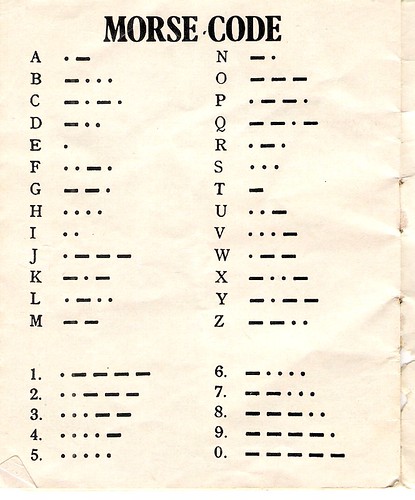Sign Language
A sign language is a language which uses manual communication, body language and lip patterns instead of sound to convey meaning—simultaneously combining hand shapes, orientation and movement of the hands, arms or body, and facial expressions to express fluidly a speaker's thoughts. Sign languages commonly develop in deaf communities, which can include interpreters and friends and families of deaf people as well as people who are deaf or hard of hearing themselves.
This is a list of basic sign language...alphaberts and some numerals (I could not find a better picture for it...this is the best I found so far)
 Morse code
Morse codeMorse code is a character encoding for transmitting telegraphic information, using standardized sequences of short and long elements to represent the letters,numerals,punctuation and special characters of a given message. The short and long elements can be formed by sounds, marks, or pulses, in on off keying and are commonly known as "dots" and "dashes" or "dits" and "dahs".

For more info about Morse Code : http://morsecode.scphillips.com/morse2.html
Semaphore Flag Signalling System
The Semaphore flag signaling system is an alphabet signalling system based on the waving of a pair of hand-held flags in a particular pattern.

For more info about Semaphore Flag Signalling System : http://www.anbg.gov.au/flags/semaphore.html
Learning all these alternate languages may come in handy at certain situations... you will know the use of it when you come across some situations...
Examples : Trying to signal your friend from far, trying to communicate with your friend without allowing others know what you are trying to say(it is easier to learn all of these alternate language than learning a whole new language).
If you are planning to learn some... good luck~ !






















































